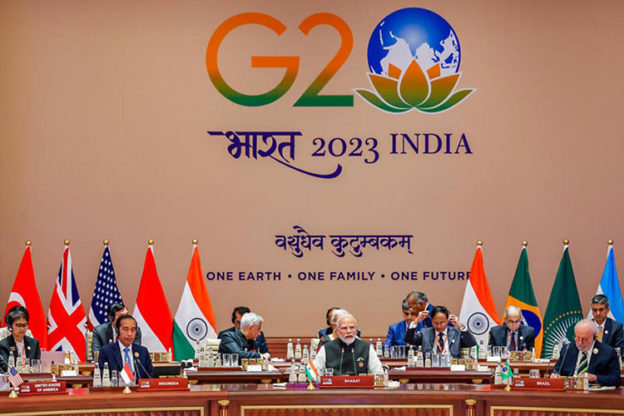At a special briefing in New Delhi, external affairs minister Dr S Jaishankar highlighted the historical ambition of India’s presidency within the G20.
In a momentous event during India’s G20 presidency, Prime Minister Narendra Modi proudly announced the official adoption of the Joint Communiqué by the participating members. This declaration, which carries immense significance, was achieved through the tireless efforts of various teams and signifies a crucial milestone.
At a special briefing in New Delhi, external affairs minister Dr S Jaishankar highlighted the historical ambition of India’s presidency within the G20. This ambition was reflected in the notable 112 outcomes and presidency documents, which according to the G20 Sherpa was a threefold increase compared to previous presidencies.
There were initial doubts about India’s ability to forge a consensus on contentious issues among the participating nations. However, these doubts were ultimately dispelled.
So, what exactly does this Joint Communiqué convey?
The Joint Communiqué, also known as the New Delhi Leaders Declaration, comprises 112 outcomes and presidency documents, which is a remarkable achievement, doubling the work accomplished by previous presidencies. Importantly, it secured full consensus among the participating members on developmental and geo-political matters.
The declaration’s core objectives include promoting robust, sustainable, balanced, and inclusive growth. It strives to accelerate progress toward the Sustainable Development Goals (SDGs), envisions a green development pact for a sustainable future, and endorses high-level principles regarding sustainable development lifestyles.
Furthermore, the declaration reiterates Prime Minister Narendra Modi’s assertion that the current era should not be defined by warfare. Instead, it calls upon states to uphold international law, sovereignty, and international humanitarian law.
The G20 declaration also emphasizes the prioritization of sustainability-based development to reduce burdens and create a better world for future generations. This includes a push for food security through the promotion of millets and the pursuit of equitable healthcare for all.
Addressing climate change, the leaders’ declaration urges G20 member states to establish an ambitious, transparent, and trackable New Collective Quantified Goal (NCQG) for climate finance by 2024, starting from a base of $100 billion annually. This effort takes into account the needs and priorities of developing countries, aligning with the objectives of the United Nations Framework Convention on Climate Change and the Paris Agreement.
Key Highlights of the New Delhi Leaders Declaration:
- Accelerate strong, sustainable, balanced, and inclusive growth.
- Accelerate the full and effective implementation of the 2030 Agenda for Sustainable Development.
- Pursue low-carbon emissions, climate-resilient, and environmentally sustainable development.
- Improve access to medical countermeasures and bolster production capacities in developing countries.
- Promote resilient growth by addressing debt vulnerabilities in developing nations.
- Increase financing from all sources to expedite progress on SDGs.
- Expedite efforts and allocate resources to achieve the goals of the Paris Agreement, including its temperature targets.
Why is this Leaders Declaration of utmost importance?
The G20 meetings represent a year-long series of discussions and negotiations involving various bodies, such as the Finance Track, Sherpa Track, civil society groups, ministers, delegates, and diplomats. During India’s presidency, an impressive 220 meetings were held in 60 cities, with over 25,000 delegates from more than 115 countries participating.
The G20 summit serves as the culmination of these year-long processes, bringing together ministers, senior officials, and civil society groups. At the summit’s conclusion, a joint communique is agreed upon by all participating nations, outlining common positions on global issues, including conflicts and climate change, and areas of future cooperation.
Notably, in the previous year’s summit in Bali, differences over Russia’s invasion of Ukraine hindered deliberations, resulting in a weaker declaration. Concerns existed that key members might be deeply divided over Russia’s actions in Ukraine, and there were speculations about China opposing India’s stance during the summit.
However, India managed to surpass expectations by producing an impressive 91 lines of effort and presidency documents.
India’s Achievements:
India’s G20 Presidency stands out as one of the most inclusive, culturally vibrant, and goal-oriented events in history. Notably, the full membership of the African Union emerged as a tangible outcome from the summit.
This event provided a platform to showcase India’s commitment to development, the utilization of technology for improving living conditions, and the pursuit of peace throughout the nation.
The G20 leaders pledged support for tripling global renewable energy capacity by 2030, demonstrating a strong commitment to addressing climate change.
In conclusion, the joint declaration issued at the G20 summit in New Delhi marks a significant achievement for India’s presidency. It underscores the commitment of participating nations to work together on critical global issues, ranging from sustainable development to climate change and international peace. This declaration reaffirms the importance of multilateral cooperation in tackling the complex challenges of our time.
https://www.financialexpress.com/business/defence-indias-historic-g20-presidency-a-comprehensive-look-at-the-new-delhi-leaders-declaration-and-its-global-impact-3238285/





